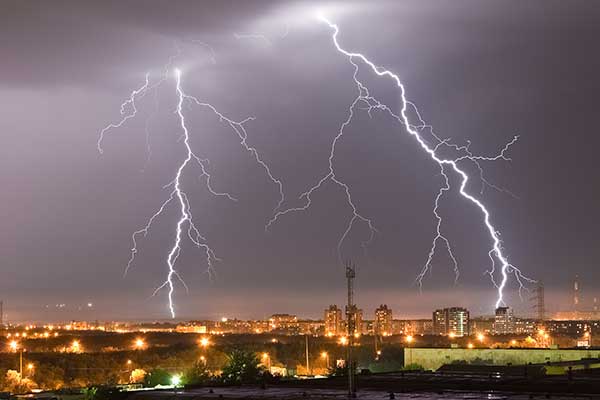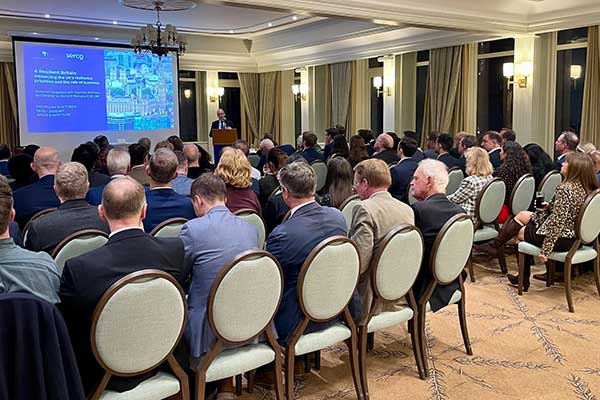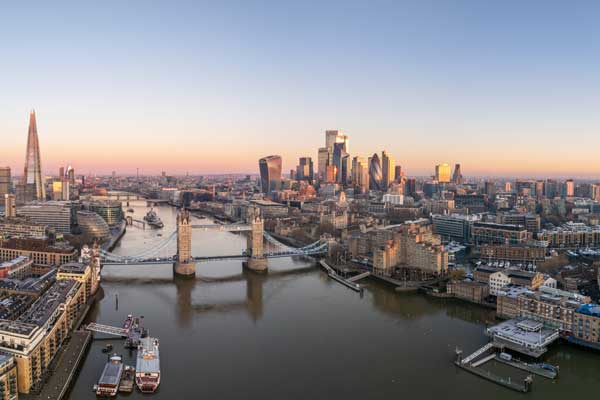Resilience First is going through a period of change, and under the leadership of Executive Director Martyn Link, the organisation is reshaping to adapt to an innovative and strategic approach. Recently we added two new stars to the team: Shazre Quamber-Hill, Director of Network Strategy and Impact, and George Karagiannis, Engineering Leadership Group Director.
To get to know Shazre and George, we invited them for a Q&A session.

First up was Shazre Quamber-Hill. Shazre is a programme leader and strategic advisor with over 10 years’ experience in designing and delivering high-impact initiatives for some of the world’s leading organisations and through public-private partnerships. Shazre joins Resilience First from the Coalition for Climate Resilient Investment where she was the Programmes & Partnerships lead. Prior to this she spent a number of years as a senior consultant within the Human Capital advisory business of WTW (Willis Towers Watson).
She holds an MSc. in Conflict and Development from SOAS, University of London, and a BSc. (Hons) in Social Sciences and Economics.
At Resilience First Shazre will be shaping a clear and impactful vision for our members, designing unique resilience initiatives and developing strong strategic partnerships across the wider Resilience Rising Consortium.
RF: Hi Shazre, what does resilience mean to you?
SQH: There are many ways to define resilience but to me, resilience is the ability to confidently navigate crises, and come out stronger on the other side. Contrary to popular belief, it is not the mitigation or absence of risk or threat(s) but rather the ability to thrive in spite of them. Resilience is also not something static, that once achieved can be left to defend the individual or organisation. True resilience is much more dynamic – an art rather than a science, and something that needs to be actively and consistently worked upon. As a response to environmental factors, resilience requires its ‘owner’ to be agile and alert; understanding, anticipating, and adapting to a constantly changing world.
RF: What motivates you?
SQH: I have always been curious and inquisitive, and this has been the driving force in my life – my desire to meet a variety of people and learn from new experiences is reflected not just in my career choices, but also in my life more broadly. From moving to a new country in my twenties, working with clients and teams around the world, to pivoting my career in my thirties, the desire to continuously learn and grow has been a constant. I am also now hugely motivated by my daughter – both in terms of role modelling a meaningful and fulfilling professional life as well as the desire to leave the world a better place for the next generation.
RF: With whom would you dream to work and why?
SQH: I am inspired by the increasing number of talented women in leadership roles and hope to have the privilege to work with and learn from as many of these amazing professionals as I can.
RF: What did you want to be when you were a child?
SQH: Aside from a brief fascination with ballet at age 5, my curiosity and desire to travel has always driven the many varied ambitions I had growing up: astronaut, pilot, humanitarian aid worker, international correspondent, and the ultimate dream for anyone with a case of wanderlust – reviewer and writer for the lonely planet!
RF: What is the most unusual item in your desk drawer?
SQH: A small pink shell I found a few years ago in a box of my belongings at my parents’ house. Growing up, I had many privileges but unfortunately extensive travel was not one of them so the first time I went to the seaside was age 15. This is a shell I found that day, which I now keep as a reminder of the wonder of new experiences.
RF: What’s on your bucket list?
SQH: It used to be a long list of individual experiences but in recent years has become quite simple – to live by the ocean, preferably somewhere warm. Doesn’t need to be particularly luxurious, but good company and decent coffee would be the icing on this Robinson Crusoe-esque cake. It also makes my current focus on driving climate resilience and managing the impacts of climate change all the more imperative!
Next up for our set of gruelling questions was George Karagiannis. George is the Director of the Engineering Leadership Group, the first of its kind peer to peer engagement platform with a vision to capture the voice of engineering firms worldwide. The Engineering Leadership Group is created and delivered by Resilience First and the International Coalition for Sustainable Infrastructure.
Previously, George was Greece’s Deputy Secretary-General for Civil Protection. And before that, he was Technical Officer at the European Commission Joint Research Center, where his area of expertise revolved around emergency management, critical infrastructure protection and hybrid threats. George has also worked as a Disaster Management Consultant.
George has a Doctorate in Environmental Science and Engineering from Saint-Etienne School of Mines in France. He also holds degrees in Civil Engineering, Disaster Management and Business Administration, and is a Certified Emergency Manager by the International Association of Emergency Managers.
RF: Hi George, what does resilience mean to you?
GK: Although a conclusive definition remains elusive, resilience is generally construed as the capability to “get back up” once you’ve been “knocked down”. In other words, a resilient system is one in which failures are unlikely, the consequences of failures are tolerable, and recovery after a failure is quick. This implies several aspects of resilience. First, it is acceptable to be “knocked down”. Robustness is one of the determinants of resilience, but unlimited robustness is neither technically feasible nor economically sustainable. Resilient systems are robust up to a level, which depends, by-and-large, on the system’s risk tolerance and resilience objectives. Second, redundancies are needed to mitigate critical failures. Similarly to the previous point, one cannot reasonably expect all components of a system to have a redundant, but resilient systems take action to limit the consequences of failures of mission-critical components. Third, resilience requires some level of incident management capability, or the adaptive capability to identify problems, assign priorities, mobilise resources and coordinate operations. Last, resilient systems are able to quickly resume operations, even if this means putting together interim solutions at a lower output level until full capacity can be restored.
RF: What motivates you?
GK: I studied to be an engineer, so I am naturally motivated by a challenge, a problem to solve. And the more cross-disciplinary the problem, the better. I crave intellectually stimulating work, and the opportunity to bring together multiple disciplines to solve complex real-life problems surely tops the list.
RF: Who is or was your mentor and why?
GK: I take every opportunity to learn new skills and expand my understanding of the world. The person I consider as my mentor is Professor Costas Synolakis of the University of Southern California and the Academy of Athens, whom I’ve had the privilege of working with for the best part of four years. In addition to passing on a wealth of knowledge about geohazards and disaster risk management, Professor Synolakis taught me never to give up, or, in his own words, “when you really want something, the sky’s the limit”.
RF: What did you want to be when you were a child?
GK: Like most children probably, I went through several iterations, including the classical options of becoming a lawyer, a doctor, a police officer and, surprisingly, a heavy machinery operator. I didn’t think of becoming a pilot until my early teens. I never thought of becoming an astronaut, although I find space technology and astronautical engineering fascinating to this day and age.
RF: What’s your favourite sports team and why?
GK: Being a proud Greek, I will say the NBA Milwaukee Bucks, home of Greek-Nigerian power forward Giannis Antetokounmpo, also known as the “Greek Freak”.
RF: What’s on your bucket list?
GK: I used to be a Boy Scout, and I have loved hiking ever since. Hiking the Highlands of Scotland is one of the things I would like to do one day: I appreciate the unique combination of history and nature.
Thanks to both Shazre and George for their time and we look forward to seeing the results of their collaborations with many of you over the course of the year.



